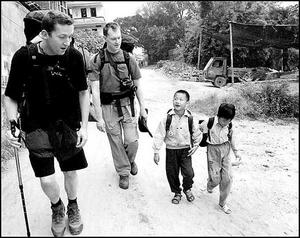 Andrew McEwen and Edmund Jocelyn set off on October 16 from Yudu in Jiangxi province to retrace the route of the Long March. Their journey - entirely on foot - will cover 6,000 miles, eight provinces, two autonomous regions and will take 368 days. This is the first of a regular series of columns from the frontline of the new Long March. To follow their progress, check out . Andrew McEwen and Edmund Jocelyn set off on October 16 from Yudu in Jiangxi province to retrace the route of the Long March. Their journey - entirely on foot - will cover 6,000 miles, eight provinces, two autonomous regions and will take 368 days. This is the first of a regular series of columns from the frontline of the new Long March. To follow their progress, check out .
A lot of people have asked us why we decided to do the new Long March. It's a simple enough question. It deserves a simple answer. What follows is not that simple.
Today in a village in northern Guangdong, we met a travelling businessman buying ornamental rocks for the Beijing Olympic Village. He had bought and sold one rock that weighed 70 tonnes.
Yesterday, after walking 33 kilometres over two and half mountains, we descendedsintosa mining town at dusk. We were the first foreigners anyone there could recall seeing. The entire town - except for two hairdressing salons - was dark by 11 on Saturday night.
A week ago, we discovered a new term, baoyu, whilst stranded in a Jiangxi county town in a torrential downpour, our third consecutive day of constant rain.
Ten days ago, we sat in a cosy mudbrick house drinking tea with asgroupsof elderly Jiangxi women. A younger woman spent more than 20 minutes repairing a red plastic ladle saucepan with strips of melted blue plastic using a homemade gasoline torch. Asked if she would agree to a photo, she said "no". And stopped fixing it.
Almost two weeks ago, we learned residents of one Jiangxi county are told that raising children is not as useful as growing oranges.
Almost three weeks ago, we met a man in Jiangxi carrying 60 jin of rice on a shoulder pole. He showed us around his property,swhereswe learned a little Red Army folklore.
On the second day, we met a very, very old man who had joined the Reds in '34. But unable to break through the blockade at Xinfeng, he had returned home to tend the fields. Today, almost deaf, this "short marcher" lives in a small house in a small village in Li Cun. Imagine, said a Qingdao friend, if that old man had broken through the blockade back in '34: Today, instead of sitting talking to two big-noses in an anonymous village, he might be a four-star general plotting political strategy at a party congress in Beijing.
"Or long dead," said Ed.
On the first day, local Yudu TV and newspapers show up to film our departure. But it's very low-key as our Beijing friends tag along for the day. Students on their way to a Yudu primary school form a fun escort. A Jiangnan City Daily photographer says he overheard one of the children saying, "I wish I had studied English harder - then I could talk to them."
Travelling through Jiangxi and now Guangdong, we are amazed by how many people have apparently seen us on TV or in the newspapers. From this, Ed has calculated that perhaps tens of millions of people we will never meet already know all about us. Most of them are probably asking the same question: Why are two foreigners doing a new Long March?
More than two years ago, we sat on the pavement of a bridge in Congjiang, Guizhou, with two bottles of beer under a starry sky. Passing pedestrians paused in astonishment. Many mustered a "hullo". Ed turned to Andy and said, "You know what would be really cool?"
| ![]() 本网站由北京信息港提供网络支持
本网站由北京信息港提供网络支持
![]() 本网站由北京信息港提供网络支持
本网站由北京信息港提供网络支持